CSotD: More Blessed to Give, or to Receive?
Skip to comments
Israel’s attack on Hezbollah through booby-trapped pagers and phones has unleashed such a flood of political cartoons that it’s hard to choose a reasonable number and then to decide where to start.
But Peter Brookes lays out something of an overview in this progression of our ability to kill one another.
As it happens, he doesn’t include a flintlock rifle, but I’ve written about the Revolution and the War of 1812, and in those wars, American snipers killed a number of British commanders with rifles, which were far more accurate and long-range than muskets. Nelson was also killed at Trafalgar by a French sharpshooter, and it was considered, if not quite a war crime, certainly unsporting.

They didn’t much like it two or three centuries earlier, either, when footmen with halberds began pulling knights down from their horses with the hook, hacking open their armor with the axe and stabbing them with the point.
In the words of Roseanne Roseannadanna, it’s always something. Germany bombs London, so England firebombs Dresden. The Japanese ravage through Nanking and the Philippines, the US drops atomic bombs on Hiroshima and Nagasaki.
Progress is our most important product.
Juxtaposition of the Peacemakers
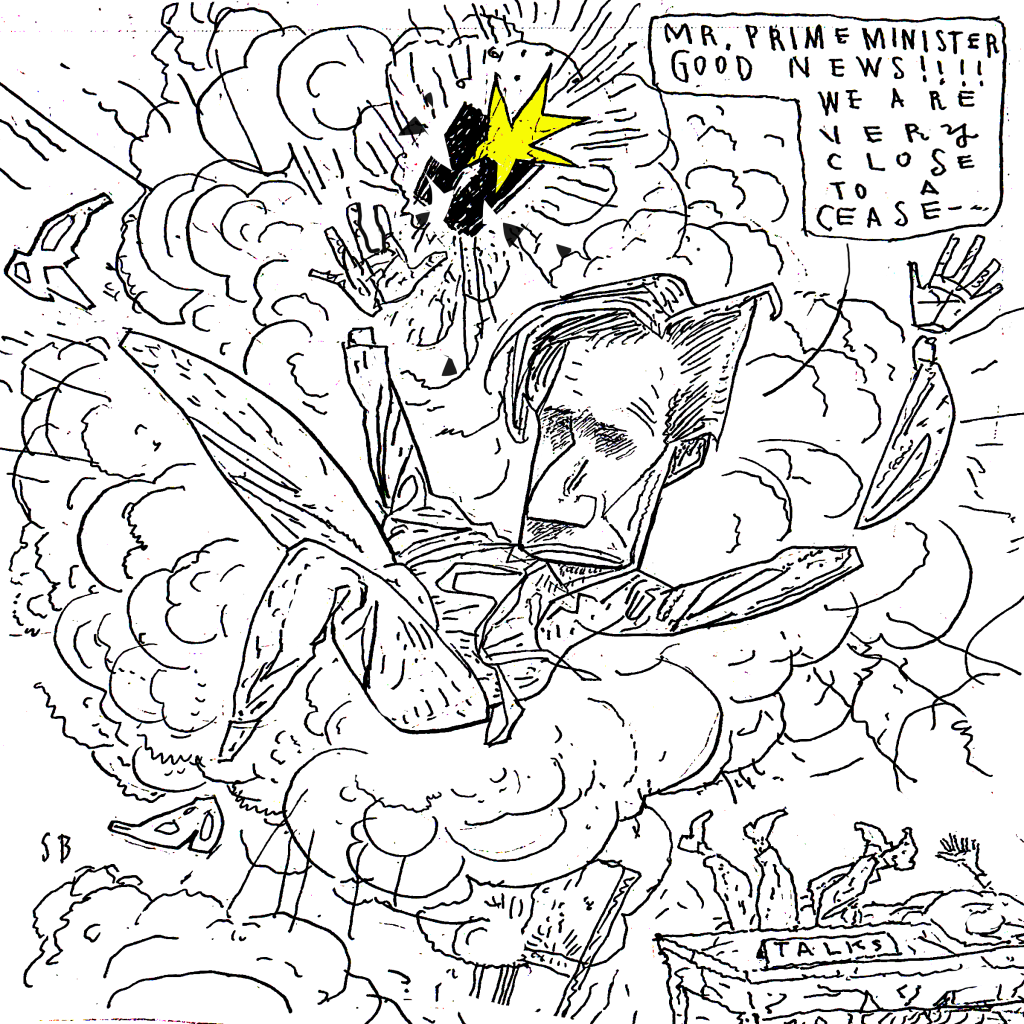
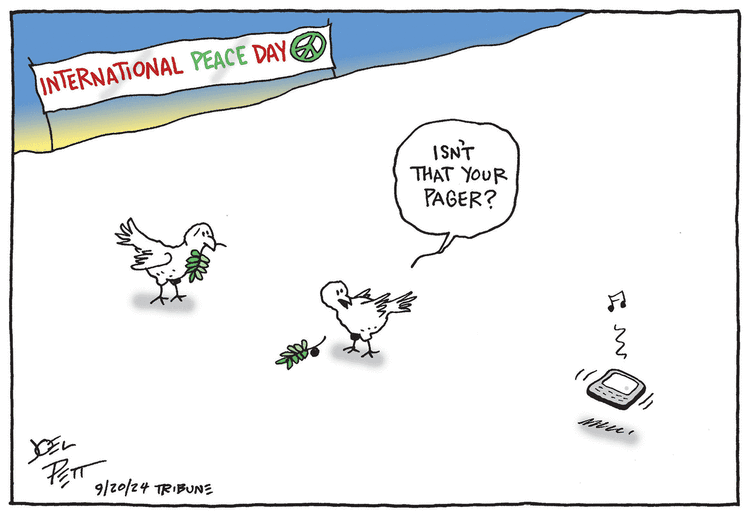

So near and yet so far. Brodner, Pett and MacLeod decry the move by Israel, coming as it did at a point when it seemed outside nations might have brokered a ceasefire, if not necessarily a permanent peace.
From a strictly American standpoint, it does seem something of a betrayal, given the justifications we advanced for having provided armaments that were only supposed to be used to defend against outside attacks, and the apparent willingness Blinken had found for Netanyahu to listen to peace overtures while Israelis demonstrated in the streets for an end to hostilities.
Whether you quote Jeremiah or cite Patrick Henry quoting Jeremiah, men cry peace! peace! but there is no peace.
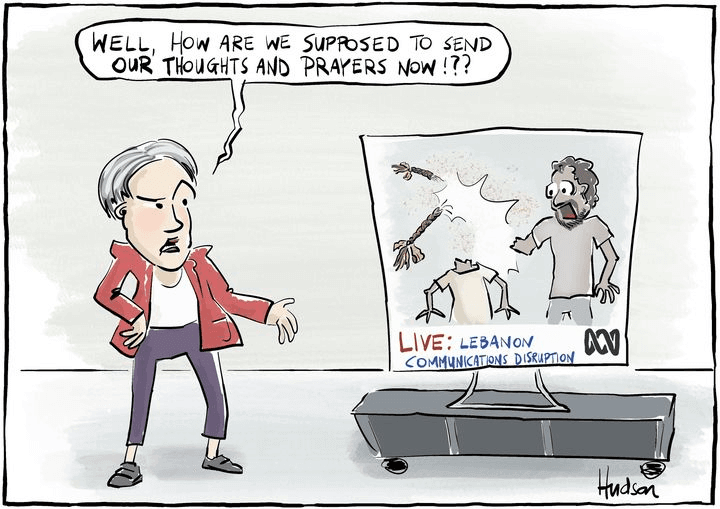
Pat Hudson, by contrast, suggests that most nations weren’t terribly invested in genuine solutions in the first place, and that the move simply makes it harder for everybody to pretend to care.
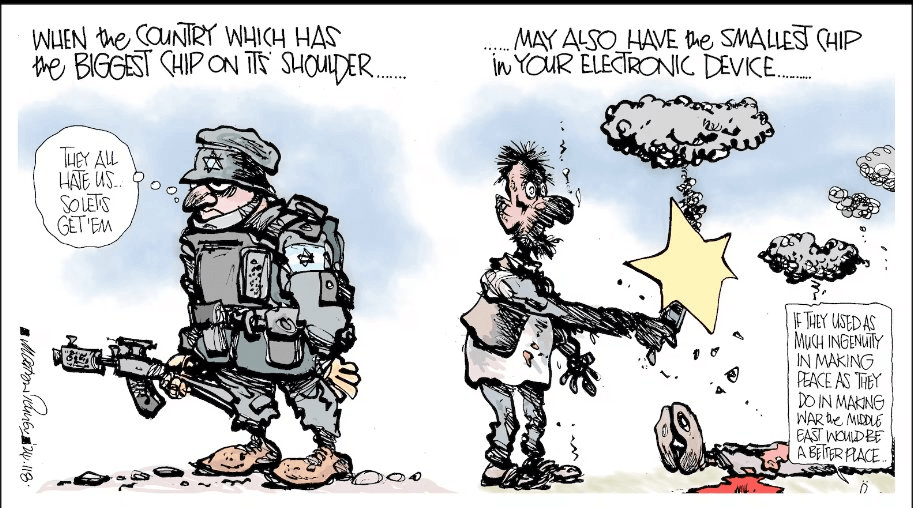
Martyn Turner takes a harsh view, accusing Israel of policies which made the booby-trap attacks inevitable, and while you don’t have to agree with his feeling that Israel has a chip on its shoulder, others have observed that the planting of these devices had to have been well under way before the October 7 attacks.
That aside from whether you have to differentiate between Hamas and Hezbollah. Or acknowledge Sherman’s observation that war is Hell and that there’s nothing romantic or heroic about it.
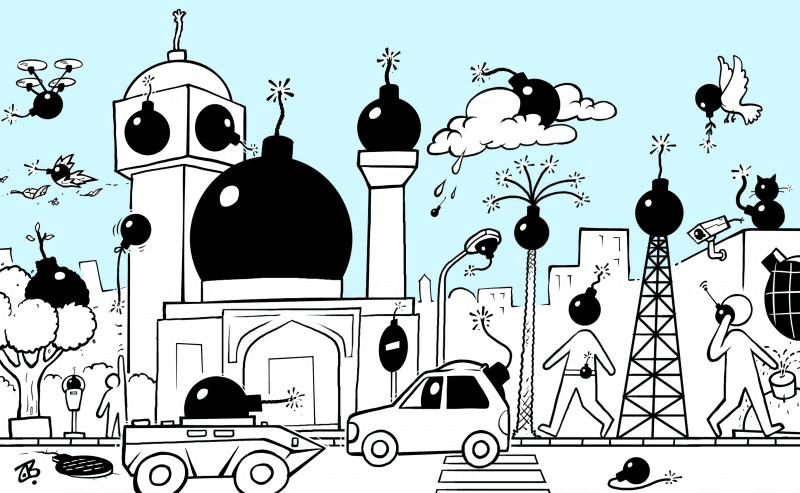
Observing the world from Jordan, Emad Hajjaj (Cartoon Movement) depicts a world forever changed by this latest technical advance, and, while the architecture in his cartoon suggests the Middle East, the accusation and prediction stretch well beyond any particular region.
It almost makes us seem naive to worry that foreign governments might be rigging our communication devices in order to spy on us, when we’ve now got evidence that they could, instead, be planting the seeds of a nationwide Pearl Harbor.
Never mind “What’s in your wallet?” What’s in your phone?

International cartoons have a tendency to depict what is, often without taking a stance, so that it’s hard to go through the pieces at Cartoon Movement and come away with a consensus beyond horror. Paresh Nath depicts death in a deadly vehicle, and he obviously takes a negative view of things there, but without actually placing specific blame.
Not that there isn’t cause to call down a curse on both their houses, but it doesn’t point towards a solution. And maybe there isn’t one, but cursing both sides seems defeatist if perhaps realistic.
Juxtaposition of the Lambs
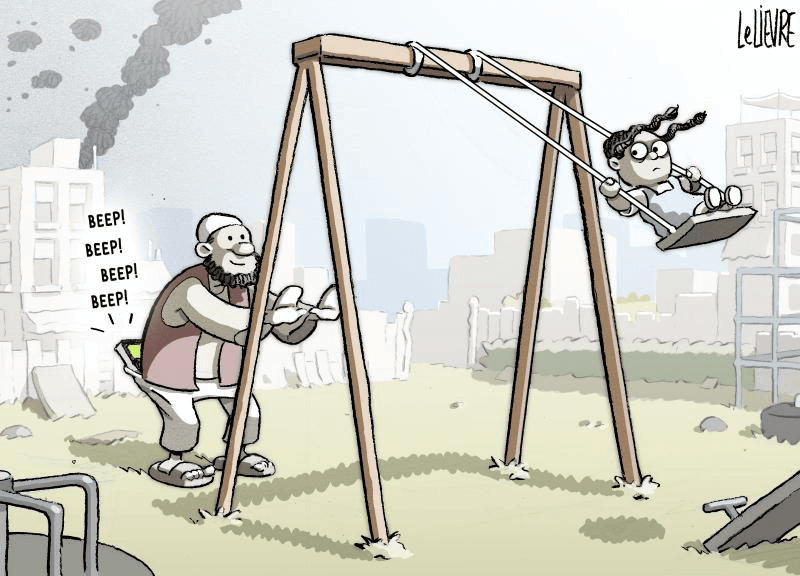

LeLievre makes the point that, while well-targeted, the devices have still resulted in the deaths of civilians who happened to be in the vicinity of the targets of this sudden attack. By contrast, Jones suggests that the IDF, which has been accused of targeting reporters and other civilians in the past, was well aware that there would be collateral damage and didn’t care.
There are points made in both accusations. If a hit on Tony Soprano were to also kill Meadow, well, she was the daughter of a mob boss, not just some innocent kid passing by.
But tossing a grenade into that diner would have clearly risked killed people with no connection to the mob, and we’re still sorting out how 40,000 deaths in Gaza are a fair exchange for 1,200 October 7 victims.
It’s not a math problem. War never is.

Nor is war amusing, even if you despise the targets of a strike. I think Rob Rogers might have found a better way to express his apparent satisfaction with the hits on Hezbollah members.
His take, however, is relatively benign among those who celebrate the strikes.

DD Degg has covered Henry Payne (AMS)’s contemptible attack on a member of congress who is not Lebanese in the first place and who, though sympathetic to Palestinian issues, is yet a bystander and not a terrorist.
Degg’s article is worth reading, Payne’s cartoon was not.

Paolo Lombardi (Cartoon Movement) lands somewhere between Rogers and Payne, depicting a smiling Netanyahu pressing the button to kill an anonymous Hezbollah member.
There is an element here of not facing the man you kill, though airplanes and long-range artillery have long made it possible to kill without having to watch anybody die.

And for that matter, those who plant bombs are gone before the bodies of their victims are torn apart. Andreyi Petranko (Cartoon Movement) riffs on one of the cartoons drawn in the famous “contest” held to purposely insult Muslims, suggesting the explosions were revenge for terrorism.

And Marian Kamensky (Cartoon Movement) doubles down on the racial insults with hairy sweatiness and yellow teeth, as he quotes a bit of militant folklore most Islamic experts say is a mistranslation of a portion of the Quran rarely taught in mainstream mosques.
It is, granted, a challenge to depict militants in a way that does not smear an entire culture, but this isn’t how it’s done.
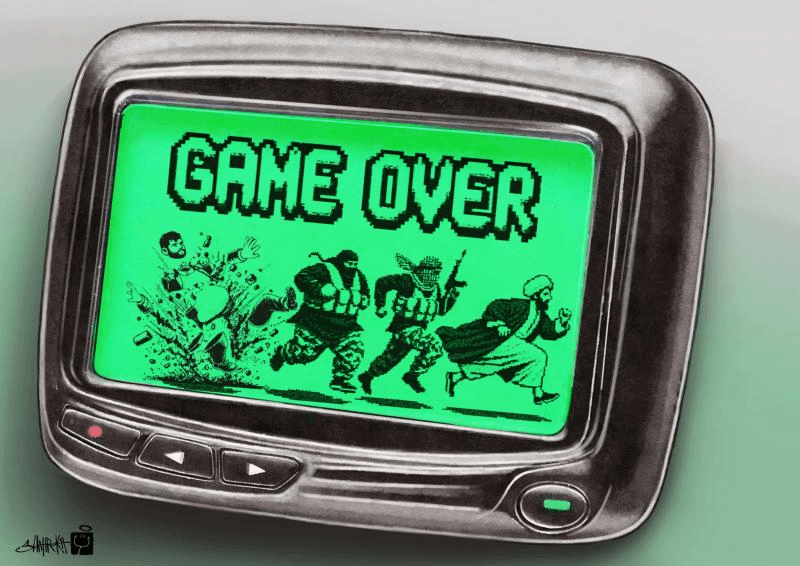
Finally, alas, Shahrokh Heidari (Cartoon Movement) makes a celebratory observation he can’t possibly believe himself.
Thank God/Allah/Jehovah that people keep trying. (Bring up the closed captions)
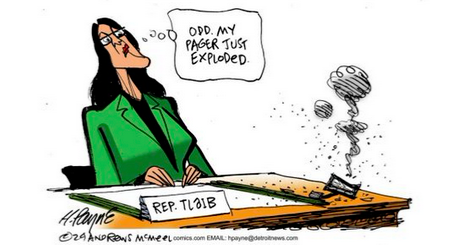
Comments 7
Comments are closed.